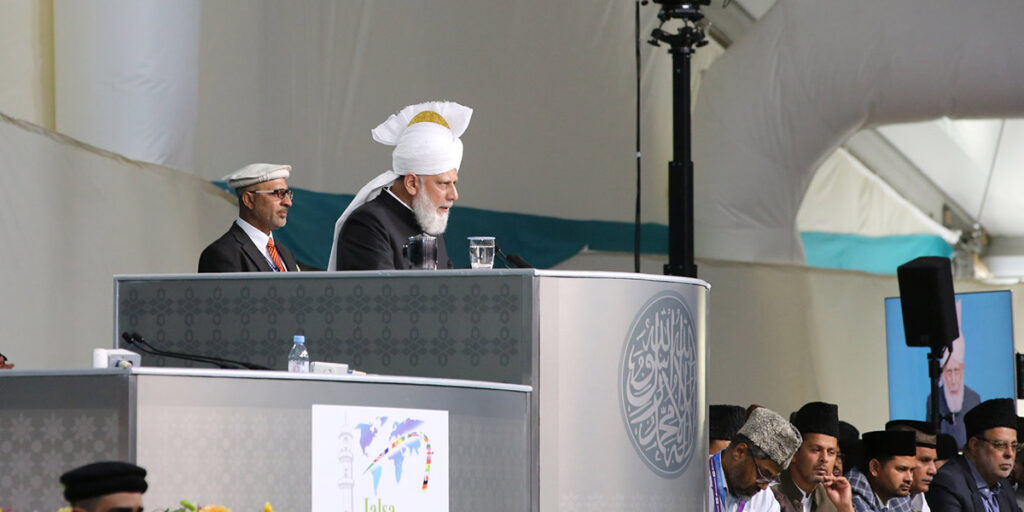
After Tashahud, Ta‘awuz and Surah al-Fatihah, Huzoor(aa) recited verse 194 of Surah Al-e-Imran followed by its Urdu translation.
Huzoor(aa) expressed that the reason we have gathered for this Jalsa is to gain the blessings of Allah. It is Allah Who has enabled us to accept the Promised Messiah(as), Who guided us towards the teachings of Allah and His prophets.
The Promised Messiah(as) had made it clear that after performing Bai‘at, we must change ourselves in accordance with Allah and His Prophet’s(sa) commandments. Otherwise the prayer, “O our Lord, we have believed” (Surah Al-e-Imran, V:194) is completely meaningless. It is thus imperative that we self-analyse and introspect on our standards; are they in accordance with the standards set by Allah?
If we do not carry out any good works, then our claim is naught. To develop true belief, it is imperative that we try and search for the standards Allah has set for us, the standards the Holy Prophet(sa) set and the Promised Messiah(as). By doing so, we will be able to get an understanding about our condition.
We should thank Allah, Who sent the Promised Messiah(as) to refresh our faith. Further, we should thank Allah, Who has enabled us to gather for these three days of spirituality. These three days will only benefit us if we try and polish our own faith. It will only be polished if we try and live up to the standards set by the Promised Messiah(as).
Huzoor(aa) said that he would discuss various teachings of the Promised Messiah(as) that stress upon the standards he desired within members of the Jamaat.
The Promised Messiah(as) once said, “To develop true faith, righteousness is necessary because without it, faith cannot even be initiated.” It is righteousness that enables faith to grow; without it, faith can never develop.
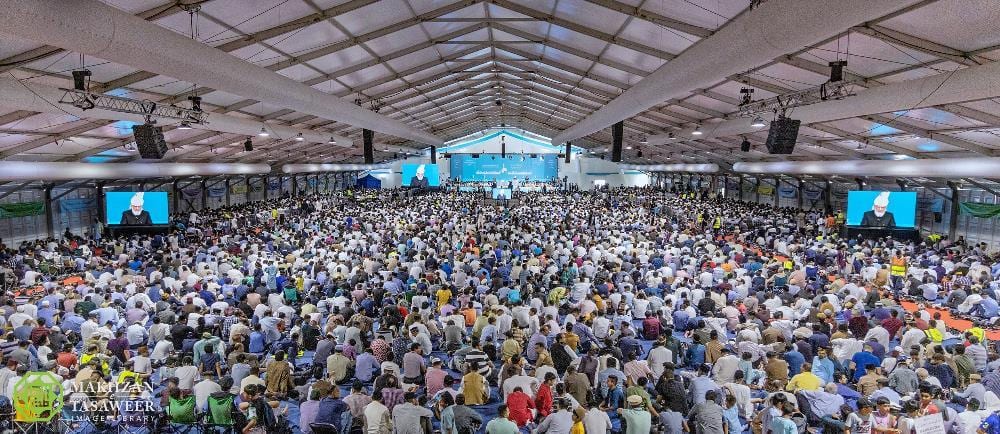
Hazrat Amirul Momineen(aa) then read out an array of extracts by the Promised Messiah(as) displaying the importance of developing Taqwa (righteousness). The Promised Messiah(as) said that if people truly were righteousness, they would never sin. The Promised Messiah(as) also expressed that the laws set by governments cannot protect one from sin. This is because governments cannot follow each person. However, if one believes that Allah is always watching them, then it is impossible to sin. On the other hand, if one thinks that Allah is not watching them, then this is the condition of an atheist.
The Promised Messiah(as) said that Allah has initiated everything with righteousness. Then, the Promised Messiah(as) said that prayers, fasting etc. will only be accepted when one is a muttaqi (righteous and God-fearing person). Once this happens, Allah bestows from where one cannot even imagine.
Reading out various verses of the Holy Quran, Huzoor(aa) relayed upon the importance of righteousness. One such verse is that angels descend upon those believers who are steadfast, and these angels inform such a person that Allah will grant them heaven and friendship.
The Promised Messiah(as) held that the plane of righteousness is empty in the current age. He said that with righteousness comes success. Looking at world religions today, righteousness has disappeared and the true God does not exist within them.
Huzoor(aa) said that Allah sends His messengers to establish righteousness within the world; the Promised Messiah(as) was sent for this reason also.
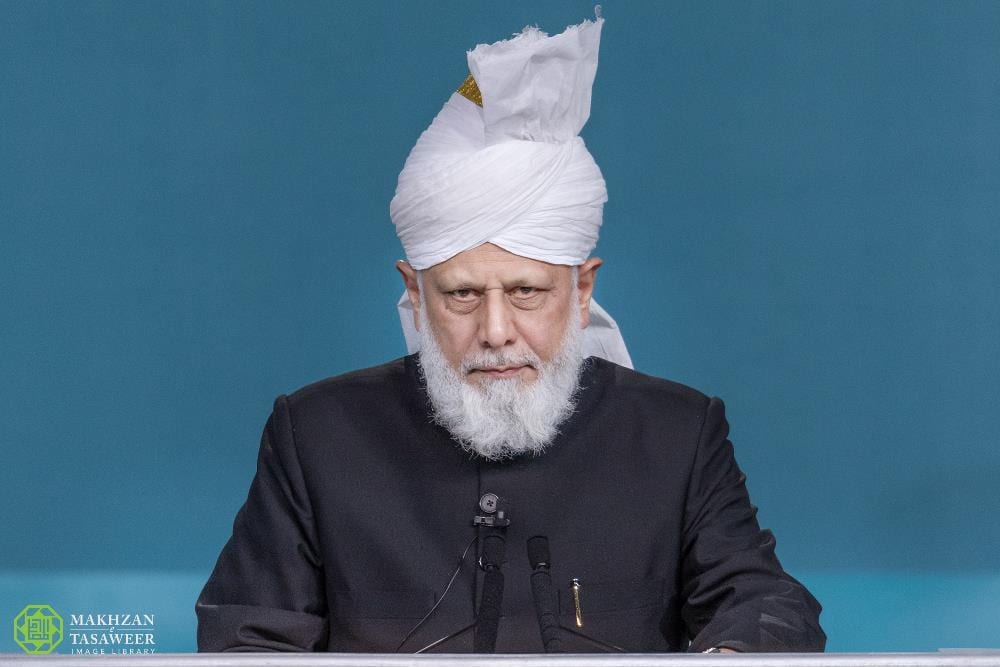
The Promised Messiah(as) said that those who only do Bai‘at to be protected from the punishment of Allah are wrong in doing so – such righteousness should be reached, which protects one from the punishment of God.
The Promised Messiah(as) taught that when one is righteous, Allah grants them salvation from every problem. It is only righteousness that is worthy of respect and one’s qualifications do not prove anything – the only thing that counts eventually is if they are righteous. The Promised Messiah(as) said that if an uneducated person is righteous, then they would be respected in the eyes of Allah.
Righteousness is not just leaving sins, rather excelling in good morals is righteousness also. Displaying a good conduct – meeting people with good manners, caring, fulfilling the rights of others, loving – is part of righteousness. Until and unless a person develops complete good morals, they shall not be named as a righteous person and possessing one or two good attributes is not enough.
The Ahadith mention that Allah becomes the feet and hands of a righteousness person.
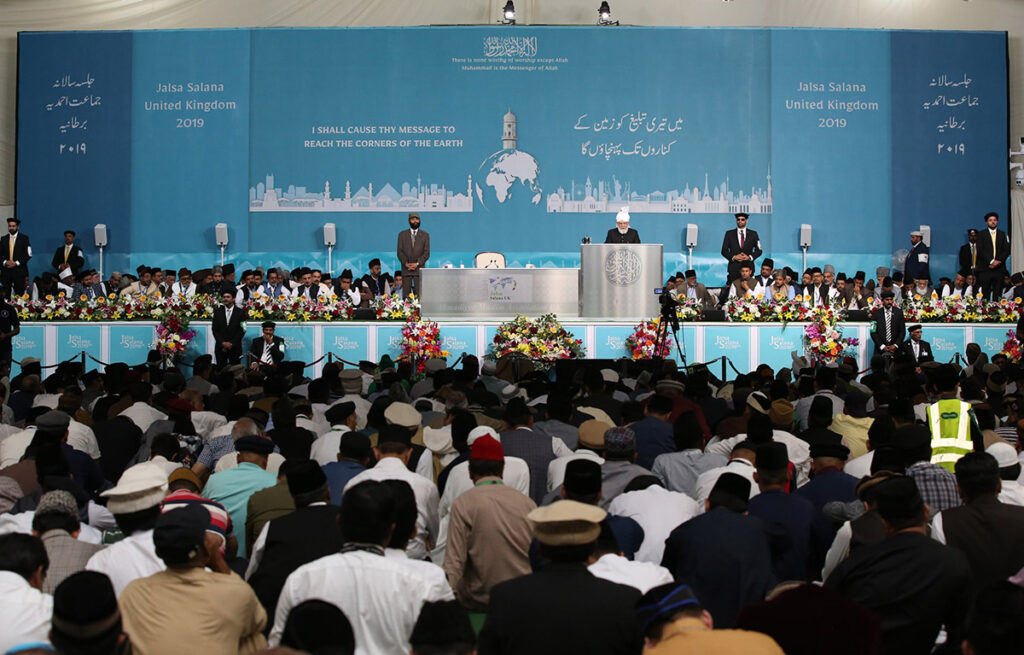
Quoting the Promised Messiah(as), Huzoor(aa) said:
“Salat has to be offered five times a day, by every person. It should not be wasted. Offer Salat continuously with such a belief that if Allah wills, He has the power to accept my prayer at this very time.”
The Promised Messiah(as) said that one should have utmost belief that Allah can accept prayers instantly within a second. Such a person should recognise that they are standing before the All-Hearing, All-Knowing and All-Encompassing God.
The Promised Messiah(as) said to pray with great fervour and to never lose hope.
When one reaches a level that they present problems and wants before Allah Alone, then this is true belief – it is this what Allah, His Prophet(sa) and the Promised Messiah(as) desire of us.
The Promised Messiah(as) explained that it is impossible for faith and sin to coexist simultaneously, much like day and night cannot. The Promised Messiah(as) said to continuously read his book, Noah’s Ark.
Huzoor(aa) said that social media is rife with attacks on the Jamaat and the Promised Messiah(as) – to counteract this we must change ourselves for the better. If we do so, Allah will come to our help.
The Promised Messiah(as) continuously told his Jamaat not to rely merely on physical proclamation of Bai‘at. The aim should be to attain the kernel, not the shell. If the follower does not act, then the holiness and purity of the saint cannot be of any benefit. Similarly, if one does not take medicine prescribed by a doctor, they will not heal.
The Promised Messiah(as) said that by merely performing Bai‘at, one cannot be satisfied. Believing alone means nothing unless it is accompanied by action. The Promised Messiah(as) thus emphasised to pray day and night, with great anguish, in order to attain guidance.
Huzoor(aa) said that it is imperative to listen to the words of the Promised Messiah(as) and act upon them.
On the subject of good works at the correct and appropriate time, the Promised Messiah(as) said that one should keep an eye out for spiritual thieves. One should always be mindful over whether they are carrying out good works for mere display. Every good action should be free from any underlying personal purpose, except the pleasure of Allah.
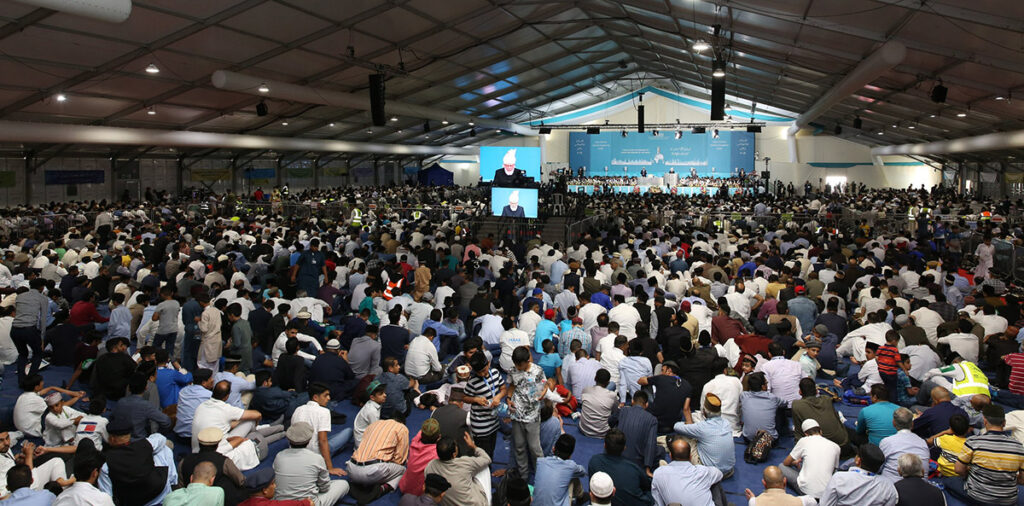
Huzoor(aa) further related extracts of the Promised Messiah(as) on the importance of carrying out righteous deeds. The Promised Messiah(as) said that even if one person is righteous within a household, the whole household is safeguarded.
The Promised Messiah(as) said that there are those who know that they commit sins, while others do not. It is for this reason that Allah has given us the opportunity for istighfar (seeking forgiveness from faults).
Huzoor(aa) said that the Promised Messiah(as) desired for his Jamaat to develop a true living connection with Allah. He wanted his Jamaat to be free from laziness as laziness stops one from praying. The Promised Messiah(as) said that only those are truly within his Jamaat who strive to act in arrogance to his teachings. Without action, one cannot reach spiritual heights.
The Promised Messiah(as) advised that one should, before every action, ask themselves whether an action is according to the will of Allah or not. They should use their intelligence to judge whether an action is positive or negative in the sight of Allah.
The Promised Messiah(as) said that after analysing the society of today, one will see that true righteousness has vanished. The Quran is in its original form, the Hadith are present, yet faith and action are not present. It is for this reason that Allah sent the Promised Messiah(as) and this is Allah’s favour upon humanity.
Huzoor(aa) said that the Promised Messiah(as) explained that avoiding sin is no merit; good actions are needed.
The Promised Messiah(as) said that Allah wants the world to know that all power lies in the hands of God; to attain this, one needs to pray. Satan desires man to be weak in this regard because he knows that whatever success man attains shall be through prayer alone.
Expounding further on the writings of the Promised Messiah(as), Huzoor(aa) said to read the Holy Quran and to never lose hope in Allah. The Promised Messiah(as) said to offer Salat in its proper manner and not to read the Quran as if it is an ordinary book. We should read it with the certainty that it is the book of Allah.
One should offer prayers during Salat. Whatever our prayers are, they should be done within Salat.
Huzoor(aa) spoke of the greatness of the Holy Quran in light of the Promised Messiah’s(as) writings. Those who think that the Quran is full of mere stories, they disrespect it and do not understand it.
The Promised Messiah(as) took pity at the spiritual condition of Muslims and the lack of good works carried out by them. Hazrat Ahmad(as) then expressed his desire for those who have a relation with him to act in accordance with the teachings of the Quran. The Jamaat that Allah wants to establish cannot be maintained without good works.
Then, the Promised Messiah(as) said, “By entering this Jamaat … you should not simply be what you were before.” A true transformation should take place, no worry should come upon a follower of the Promised Messih(as), no matter how many enemies they develop.
At the end of his speech, Huzoor(aa) prayed that Allah enables us to experience that transformation, which will enable us to attain true righteousness; that we, through our actions, are able to call the world towards the true path.
Huzoor(aa) said to pray for the condition of the world, particularly the political conditions of Muslim nations.
Huzoor(aa) prayed for peace and harmony to be established in the world and that Allah enables us to wave the standard of Islam throughout the world.
(The Weekly Al Hakam, August 2, 2019)